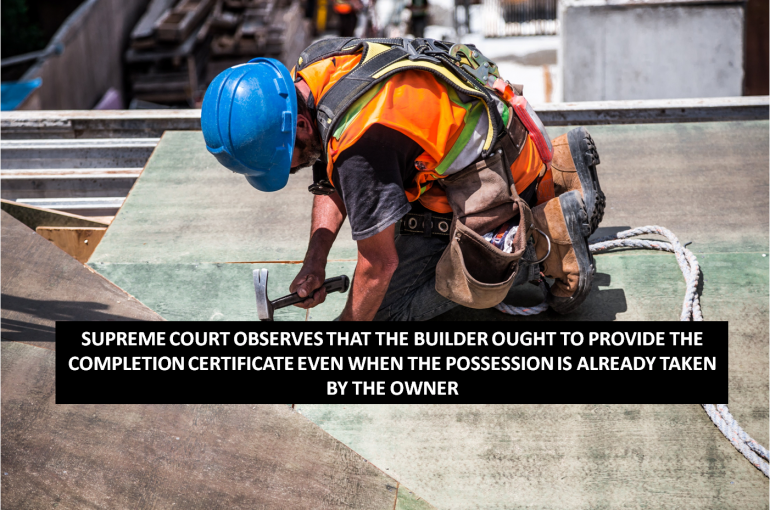SUPREME COURT OBSERVES THAT THE BUILDER OUGHT TO PROVIDE THE COMPLETION CERTIFICATE EVEN WHEN THE POSSESSION IS ALREADY TAKEN BY THE OWNER
A Two Judge Bench of the Supreme Court presided by Justice S. Ravindra Bhat and Justice Dipankar Datta passed a Judgment dated 09.02.2023 in the case of Debashis Sinha & Ors. Vs. M/S R.N.R. Enterprise & Ors. bearing Civil Appeal No.3343 Of 2020 and observed that the flat-owners, who are often forced by the circumstances to take possession of apartments even if the amenities promised by the builder are not provided, do not forfeit their right to claim such services from the builder.
Facts:
The Appellant Debashis Sinha and other Appellants are owners of flats in different blocks of a housing complex at 1, Kailash Ghosh Road, Kolkata ( ‘housing complex’ ).The Respondents, M/S R.N.R. Enterprise are the developers of the housing complex who promised to provide services to the Appellants with respect to such housing complexes.
In 2008, the Appellants alleged before the National Consumer Disputes Redressal Commission, New Delhi (“NCDRC”) that despite paying full consideration amount as per market rate and registration of deeds of conveyance in their favour, the Respondents had failed, inter alia, to provide the ‘Completion Certificate’, which is their statutory obligation as per the rules of the Kolkata Municipal Corporation (“KMC”).Further, the Respondents also failed to provide them with common amenities and facilities such as playground, community hall, beautified lake, landscape gardening, generator backup, multi-gymnasium, etc. Therefore, the Appellants sought direction to the Respondents to provide the Completion Certificate of the project and to set right the constructional defects as pointed out by the Valuer. Additionally, compensation of Rs.1,80,00,000/- together with litigation cost of Rs.50,000/- was claimed. Though the NCDRC found that the builder was guilty of unfair trade practice, it did not grant relief to the Appellants by saying that they have not established their claims. However, the Complaint of the Appellants failed before the NCDRC. Aggrieved by the Order of the NCDRC dated 21.08.2020, an appeal was filed by the Appellants before the Supreme Court.
Supreme Court Observations:
The Hon’ble Supreme Court while taking in view the casual approach of the NCDRC while recording the conduct of the Respondents in the impugned order observed that, the Respondents, on the face of it are guilty of “unfair trade practice” within the meaning of section 2(1)(r) of the Consumer Protection Act, 1986 (‘C.P. Act’) and the reason assigned defies logic. Further, the Court observed that it fails to comprehend as to what NCDRC meant when it observed that the Appellants “ought to have known what they were purchasing”. More often than not, the jurisdiction of the consumer fora under the C.P. Act is invoked post purchase. If complaints were to be spurned on the specious ground that the consumers knew what they were purchasing, the object and purpose of the enactment would be defeated.
The Hon’ble Supreme Court further observed that NCDRC, might have missed to appreciate the present day realities of life where flat owners seldom purchase flats with liquid cash. Flats are purchased on the basis of finances being advanced by banks and other financial institutions. Once a flat is booked and the prospective flat owner enters into an agreement for loan, installments fall due to be paid to clear the debt irrespective of whether the flat is ready for being delivered possession. The usual delays that are associated with construction activities result in undue anxiety, stress, and harassment for which many a prospective flat owner, it is common knowledge, even without the project/flat being wholly complete is left with no other option but to take possession. Whether, upon taking possession, a flat owner forfeits his/her right to claim such services which had been promised but are not provided resulting in deficiency in services is a question that the NCDRC ought to have adverted to. If at all, the Appellants had not forfeited any right by registration of the sale deeds and if indeed the respondents missed in providing any of the facilities/amenities as promised in the brochure/advertisement, it was the duty of the NCDRC to set things right.
The Apex Court further commented on the perfunctory approach of the NCDRC while dealing with the Appellants’ contention that it was the duty of the Respondents to apply for and obtain the completion certificate from the KMC and that the Respondents ought to have been directed to act in accordance with law. After examining the provisions of the Kolkata Municipal Corporation Act, the Court noted that “it is the obligation of the person intending to erect a
building or to execute works to apply for Completion Certificate in terms of the rules”.
The Hon’ble Supreme Court further stated that “True it is, the Appellants ought not to have taken possession without the Completion Certificate; however, that was not a valid ground not to direct the respondents to apply for and obtain the completion certificate as required by law”. With the above observations, the Supreme Court remanded the matter to the NCDRC for fresh consideration. The Court did not open the claim or Rs.1,80,00,000.00/- compensation raised by the buyers, as they have failed to give particulars and the basis for the claim.
Conclusion:-
Thus, based on the aforesaid reasoning, the Supreme Court disposed of the appeal and did not direct the NCDRC to decide on the compensation component, however, remanded the matter only with a view to secure adherence to the promises that the Respondents had made in the brochure and/or advertisement, as the case may be, and thereby to cover up deficiency in service, if any, as well as the mandatory statutory provisions.
Roopal Bardia
Associate
The Indian Lawyer





































Leave a Reply